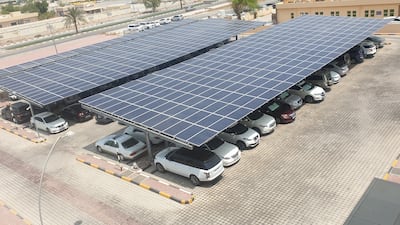The UAE’s energy ministry has teamed up with Etihad Water and Electricity (EtihadWE) to set up residential solar panels in the Northern Emirates amid plans to boost the share of renewable energy in the country’s power supply.
EtihadWE customers, including homes, businesses and farms, will be able to install rooftop solar panels to generate power, which will be sent back to the grid, the main utility for the Northern Emirates region said on Tuesday.
The project involves generating solar power through rooftop photovoltaic (PV) systems installed on properties. This power will then be fed back into the grid, boosting the overall supply of renewable energy.

Consumers will not be able to use the energy from their solar panels directly, but they will get lower energy bills for adding power to the renewable energy grid.
Customers in the programme will have two meters: one for energy sent to the grid and one for energy used from the grid.
Each month, the energy sent and used will be compared. If more energy is sent than used, the extra will be credited to their account for use later in the same year.
Dewa’s Shams Dubai programme, which has been running successfully for several years, served as a model for this initiative, an energy ministry official told reporters on the sidelines of the World Utilities Congress in Abu Dhabi on Tuesday.
Shams Dubai, first announced in 2015, seeks to encourage building owners in the emirate to install solar panels on their properties.
“We actually communicated with Dewa to get a list of approved contractors [and] makers of inverters and other [equipment], and we are applying almost a similar approach in the Northern Emirates,” said Sharif Al-Olama, the Undersecretary for Energy and Petroleum Affairs at the Ministry of Energy and Infrastructure.
“We didn’t want to reinvent the wheel,” he added.

Potential applicants have to comply with the list of approved contractors and manufacturers, Mr Al Olama said, adding that customers also need to co-ordinate with relevant authorities to obtain the necessary permits.
“[The process] should be pretty quick, within two to three weeks … there will be awareness sessions done for all the customers very soon,” he said.
The goal for this year is to reach 20 megawatts of solar power from industries or homes, and once that target is met, no more applications will be accepted, with all being processed on a “first-come, first-served” basis, the energy official said.
The UAE Energy Strategy 2050 aims to triple the share of renewable energy and invest Dh150 billion to Dh200 billion by 2030 to meet the country’s rising energy demand driven by its rapidly expanding economy.
This latest programme further strengthens the UAE’s focus on decentralised solar solutions, which are considered crucial for individuals and communities to become less reliant on a central power grid.
“This is really the way I think the future energy landscape is going to be. Rather than having huge grids covering big cities, you're going to see microgrids, because you require that kind of independence when it comes to grids,” Mr Al Olama said.
“This gives you further security of supply for your consumers, and it also puts less [pressure] on the overall national grids.”

